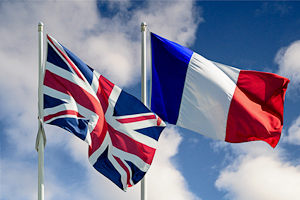French President Francois Hollande and British Prime Minister David Cameron on Friday jointly called on their EU partners to lift an arms embargo on Syria.
 French President Francois Hollande and British Prime Minister David Cameron on Friday jointly called on their EU partners to lift an arms embargo on Syria, as the Arab country marked the second anniversary of the start of its unrest.
French President Francois Hollande and British Prime Minister David Cameron on Friday jointly called on their EU partners to lift an arms embargo on Syria, as the Arab country marked the second anniversary of the start of its unrest.
Following a two-day EU summit in Brussels, Cameron told reporters he wanted a political solution in Syria, but "that is more likely if the Syrian opposition is strengthened and is growing."
London and Paris want to look at further changes in terms of the arms embargo and they have a "common analysis" of what is wrong in Syria, he said.
As to what if Britain failed to convince other EU nations on the issue, Cameron said "Britain is a sovereign country. If we want to take individual action we are free to do so."
"I sense there was a good understanding (within the EU) that the status quo is not working," he said.
Cameron's remarks were echoed by his French counterpart Hollande, who has vowed that his country would "take its own responsibility."
Hollande said that he had received guarantees from the Syrian opposition that any future arms delivered to them would end up in the right hands.
"In terms of delivering weapons... to have the best answer the opposition must give all necessary guarantees. It's because we have been given those that we can envisage the lifting of the embargo. We have the certainty on the use of these weapons," he said.
The EU has imposed an arms embargo on Syria since May, 2011, which was extended on February 28 for another three months to June 1 by EU foreign ministers. Paris and London are expected to be pushing for quick new EU talks on the embargo.
"We will use our diplomacy and explain how terrible the situation is in Syria in order to lead our European partners to that solution... Our goal is to convince our partners at the end of May, and if possible before," Hollande said on Thursday.
"If by chance there is a blockage by one or two countries, then France will take its responsibilities," he said.
However, Germany and other EU countries apparently have little appetite to end the embargo, expressing concerns that more weapons will only fuel conflicts in Syria and could end up in the wrong hands.
German Chancellor Angela Merkel said Thursday that the bloc needed to "proceed very cautiously" on the issue and her country was ready to discuss within the EU.
"If our partners in the European Union, in this case Britain and France, have a changed assessment of the situation, then the foreign ministers are of course ready to discuss this subject again," she said.
European Council president Herman Van Rompuy also said EU leaders on Friday discussed calls from Britain and France to lift the embargo.
"The question of the arms embargo was raised by some members of the European Council. We agreed to task our foreign ministers to assess the situation as a matter of priority already at their informal meeting next week in Dublin, and to develop common positions," he said.